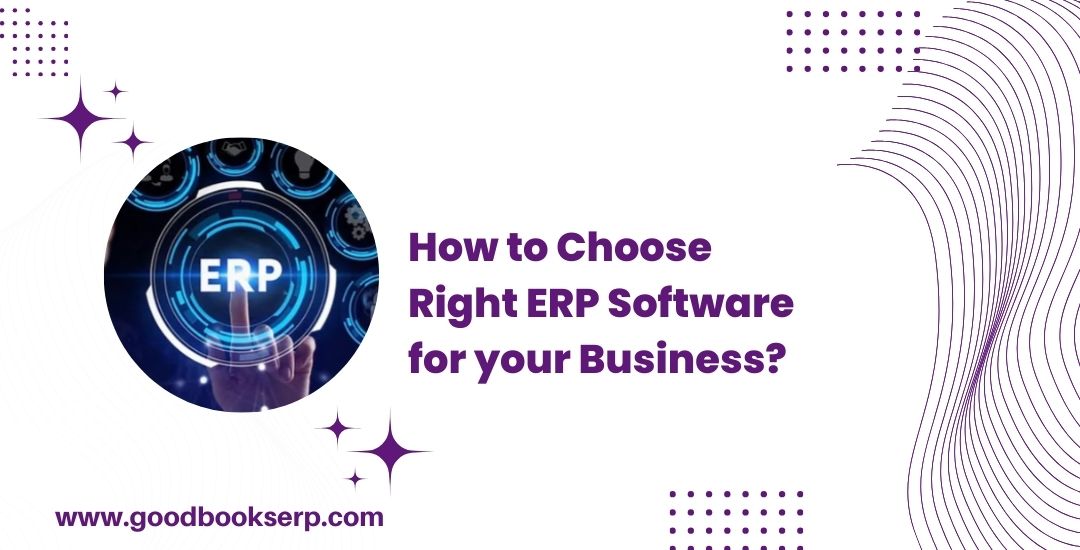Table of Contents
ToggleChoosing the Right ERP Software for Your Business
In today’s fast-paced business environment, selecting the right Enterprise Resource Planning (ERP) software is crucial for streamlining operations, enhancing efficiency, and fostering growth. With a myriad of options available in the market, finding the perfect fit for your business can be daunting. However, with a methodical approach and a clear understanding of your requirements, you can navigate through the selection process smoothly. This guide will walk you through the essential steps to choose the right ERP system tailored to your business needs.
8 Steps for Choosing the Right ERP Software:
1. Identify Your Business Requirements
Before diving into the selection process, it’s essential to have a thorough understanding of your business processes, pain points, and long-term goals. Identify areas where an ERP solution can make a significant impact, such as inventory management, financial reporting, or customer relationship management.
2. Make a List of Modules You Need
ERP systems typically offer a range of modules catering to different business functions. Create a comprehensive list of modules that align with your requirements, such as accounting, human resources, supply chain management, and manufacturing.
3. Conduct a Google Search and Compile a List of Top ERP Software
Utilize online resources, industry publications, and peer recommendations to compile a list of top 10 ERP software solutions. Pay attention to user reviews, ratings, and case studies to gauge the performance and suitability of each system.
4. Schedule Calls and Explain Your Requirements
Reach out to the vendors of shortlisted ERP software solutions to schedule introductory calls. Clearly articulate your business requirements, challenges, and expectations during these discussions to ensure that vendors understand your needs accurately.
5. Compare Pricing
Obtain detailed pricing information from each vendor, including initial setup costs, licensing fees, and ongoing maintenance expenses. Compare the pricing structures of different ERP systems to determine which offers the best value for money based on your budget constraints.
6. Shortlist 3 ERP Systems
Narrow down your options to three ERP systems that closely align with your business requirements, budget, and scalability needs. Request additional information, such as feature demos and case studies, to gain deeper insights into each solution.
7. Schedule Demos
Schedule live demos with the shortlisted ERP vendors to see their software in action. Evaluate the usability, functionality, and user interface of each system to assess how well it meets your business needs.
8. Finalize the Right One
After careful evaluation and consideration, make an informed decision to finalize the ERP software that best fits your business requirements. Negotiate contract terms, finalize implementation timelines, and establish a roadmap for deployment.
Things to Ask Before Finalizing the ERP Software:
1. Software License & Cost
Clarify the licensing model and associated costs, including upfront fees, recurring subscriptions, implementation cost, and any additional charges for upgrades or customizations.
2. Software Modules
Ensure that the ERP software offers all the necessary modules required to support your business processes effectively. Inquire about module scalability and flexibility to accommodate future growth and evolving needs.
3. Vendor Ratings & Reputation
Research the vendor’s reputation in the market by exploring customer reviews, testimonials, and industry analyst reports. Assess their track record for delivering quality products and reliable support services.
4. Implementation Process & Time
Understand the implementation methodology employed by the vendor and the estimated timeline for deploying the ERP system. Discuss potential challenges, resource requirements, and contingency plans to mitigate risks.
5. Deployment Type - SaaS or On-Premise
Determine whether the ERP solution is cloud-based (Software-as-a-Service) or requires on-premise installation. Evaluate the pros and cons of each deployment option in terms of cost, scalability, security, and accessibility.
6. Product Training
Inquire about the availability of training programs and resources to onboard your team members and ensure smooth adoption of the ERP software. Assess the quality of training materials, instructor expertise, and ongoing support channels.
7. Ongoing Support
Discuss the vendor’s support policies, service level agreements (SLAs), and channels for technical assistance and troubleshooting. Evaluate the responsiveness and reliability of their support team in addressing issues and resolving queries promptly.
Always Choose the right ERP Software
In conclusion, selecting the right ERP software is a critical decision that can significantly impact your business operations and success. By following a structured approach and leveraging the checklist provided in this guide, you can navigate the selection process with confidence and choose an ERP system that aligns with your unique business needs, objectives, and budgetary considerations. Remember to prioritize scalability, usability, and vendor reliability to ensure a successful implementation and long-term ROI.
Here is list of top 10 ERP Software in India, choose wisely.


2 thoughts on “How to choose right ERP software for your business?”